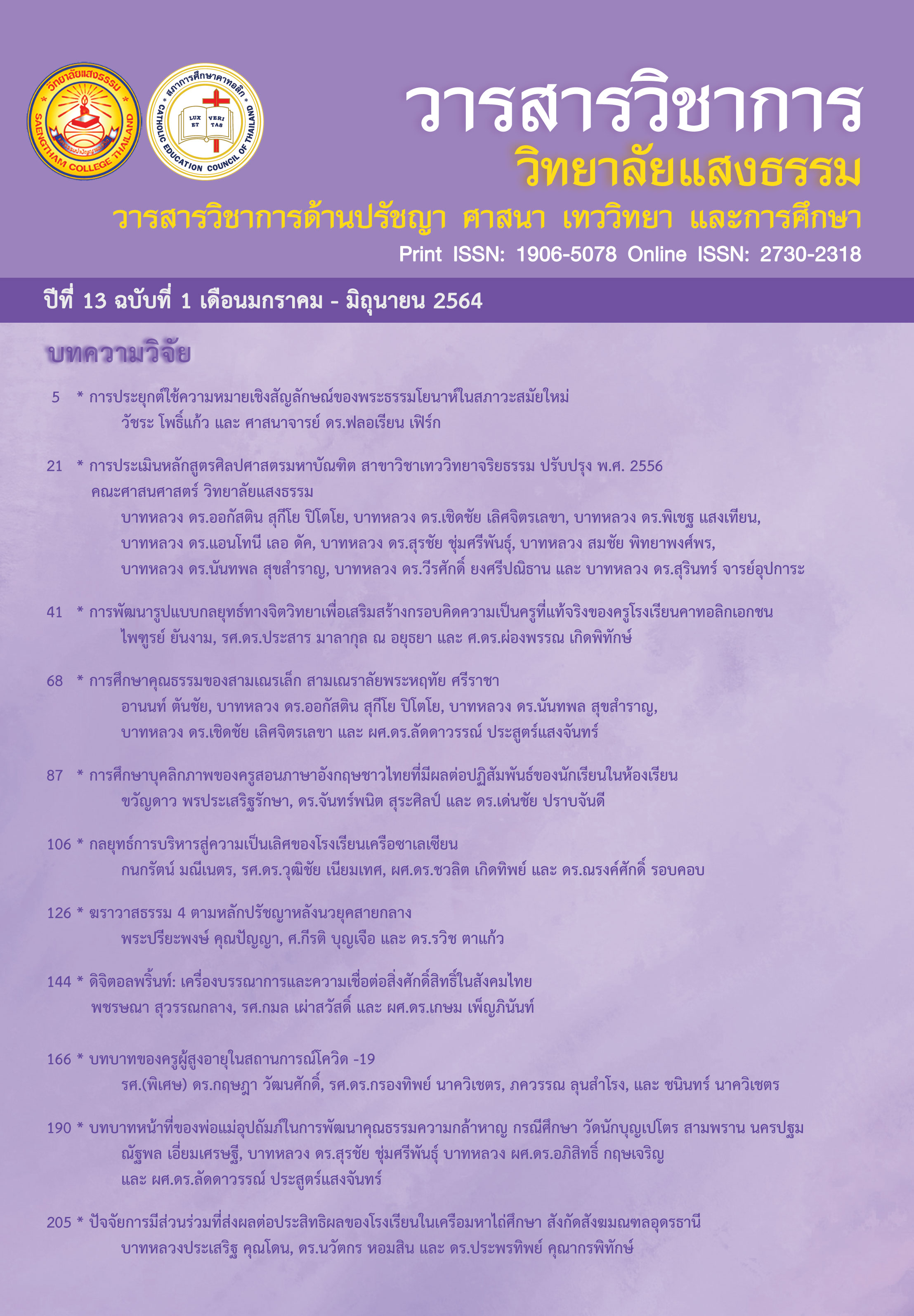The Evaluation of the Curriculum on Master of Arts Program in Moral Theology update 2013. Faculty of Divinity, Saengtham College.
Main Article Content
Abstract
The Evaluation of the Curriculum on Master of Arts Program in Moral Theology update 2013, Faculty of Divinity, Saengtham College was conducted The purposes of this study were to 1) evaluate context, input factors, process and product of curriculum. 2) evaluate Impact of curriculum on Master of Arts Program in Moral Theology updated 2013, Faculty of Divinity, Saengtham College. The CIPPI Model was used for the evaluation The sample of this research engages four administrators, seven instructors, eleven students, fifteen graduates, ten educational employers and two Pastor advisors. The research instruments included the questionnaires. The collect data were analyzed by using percentage (%), mean (X), standard deviation (S.D.) and content analysis.
The results of the study were as follows:
1. The context of the curriculum was appropriate at a high level and it showed that objectives were consistent with the policy of the Council of the Roman Catholic Bishops' Conference of Thailand and the vision, goals, philosophy, missions, policies of the Saengtham College, as well as policies in accordance with the National Qualifications Framework for Higher Education.
2. For the input factors of curriculum, it was found that course structure, course content, building, instructors, students and community cooperation were suitability/readiness at a high level.
3. For the process of curriculum, it was found that course management, learning management, measure and curriculum development were suitable at a high level.
4. For the product of curriculum, it was found that academic achievement, Knowledge, ability and desirable characteristics of the learners are suitable at a very high level.
5. For the impact of curriculum, it was found that graduates had leadership skills to be able to apply knowled e and skills be creative and able to adapt to their peers
at a very high level.
Article Details
- The academic and research articles, as well as the content and opinions expressed therein, published in Saengtham College Journal are solely the responsibility of the respective author(s).
- Articles published in Saengtham College Journal are the property of Saengtham College. Reproduction, modification, or dissemination of all or part of the content in any form without written permission from Saengtham College is prohibited.
- Articles published in Saengtham College Journal are protected under the Copyright Act.
References
ธีรศักดิ์ อุ่นอารมณ์เลิศ และคณะ. (2552). “การประเมินหลักสูตรศึกษาศาสตรมหาบัณฑิต สาขาวิชาพัฒนศึกษา คณะศึกษาศาสตร์ มหาวิทยาลัยศิลปากร.” คณะศึกษาศาสตร์ มหาวิทยาลัยศิลปากร.
วิทยาลัยแสงธรรม. (2555). คู่มือการประกันคุณภาพการศึกษาภายใน วิทยาลัยแสงธรรม ประจำปีการศึกษา 2555.
มาเรียม นิลพันธุ์ และคณะ. (2555). “การประเมินหลักสูตรศึกษาศาสตรมหาบัณฑิต สาขาวิชาหลักสูตรและการนิเทศ คณะศึกษาศาสตร์ มหาวิทยาลัยศิลปากร”. คณะศึกษาศาสตร์ มหาวิทยาลัยศิลปากร.
สภาพระสังฆราชคาทอลิกประเทศไทย. (2553). แผนอภิบาลคริสตศักราช 2010-2015 ของพระศาสนจักรคาทอลิกในประเทศไทย. กรุงเทพฯ: โรงพิมพ์อัสสัมชัญ.
สภาวิทยาลัยแสงธรรม. (2555). รายงานการประชุมสภาวิทยาลัยแสงธรรม ครั้งที่ 2/2555, วันที่ 24 พฤษภาคม 2555: 4.
Best, John W. (1997). Research in Education. 2nd. ed. New Jersey: Prentice Hall Inc.
Cronbach, Lee J. (1984). Essentials of psychological Testing. 4 th ed. New York: Harper & Row Publishers.
Stufflebeam, Daniel L. (2003). Evaluation Model. San Francisco: Jossey-Bass, 2001.
Stufflebeam, Daniel L. (2003). “The CIPP model for evaluation.” In The international handbook of educational evaluation, Chapter 2. Edited by D.L.Stufflebeam and T. Kellaghan. Boston: kluwer Academic Publishers.


